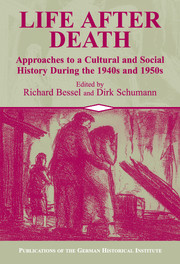Book contents
- Frontmatter
- Introduction Violence, Normality, and the Construction of Postwar Europe
- 1 Post-Traumatic Stress Disorder and World War II
- 2 Between Pain and Silence
- 3 Paths of Normalization after the Persecution of the Jews
- 4 Trauma, Memory, and Motherhood
- 5 Memory and the Narrative of Rape in Budapest and Vienna in 1945
- 6 “Going Home”
- 7 Desperately Seeking Normality
- 8 Family Life and “Normality” in Postwar British Culture
- 9 Continuities and Discontinuities of Consumer Mentality in West Germany in the 1950s
- 10 “Strengthened and Purified Through Ordeal by Fire”
- 11 The Nationalization of Victimhood
- 12 Italy after Fascism
- 13 The Politics of Post-Fascist Aesthetics
- 14 Dissonance, Normality, and the Historical Method
- Index
8 - Family Life and “Normality” in Postwar British Culture
Published online by Cambridge University Press: 05 January 2013
- Frontmatter
- Introduction Violence, Normality, and the Construction of Postwar Europe
- 1 Post-Traumatic Stress Disorder and World War II
- 2 Between Pain and Silence
- 3 Paths of Normalization after the Persecution of the Jews
- 4 Trauma, Memory, and Motherhood
- 5 Memory and the Narrative of Rape in Budapest and Vienna in 1945
- 6 “Going Home”
- 7 Desperately Seeking Normality
- 8 Family Life and “Normality” in Postwar British Culture
- 9 Continuities and Discontinuities of Consumer Mentality in West Germany in the 1950s
- 10 “Strengthened and Purified Through Ordeal by Fire”
- 11 The Nationalization of Victimhood
- 12 Italy after Fascism
- 13 The Politics of Post-Fascist Aesthetics
- 14 Dissonance, Normality, and the Historical Method
- Index
Summary
The aim of this chapter is to offer some reflections on the experience of family life in postwar Europe from the British perspective. The relative stability of British domestic history makes it one of the deviant cases of twentieth-century European history. This has to be qualified with reference to the important exception of events in Ireland; however, these have left the culture of the remainder of the British Isles extraordinarily untouched. Through the century the boundaries of the British state have remained otherwise unchanged, though in the immediate postwar years those of the once great British Empire were to shrink dramatically, with cultural effects within Britain that have barely been explored. Twentieth-century Britain has experienced no revolution, or even a serious attempt at one, has not been occupied by another power, has not lost a major war, has experienced no mass deportations, no mass rapes. This stability has had its downside, for it has bred a certain cultural conservatism and complacency. For the purposes of this book, however, it has the advantage that it offers an opportunity, less available in countries that were more profoundly disrupted by the war, to examine what in the postwar world was a direct outcome of the experience of war and what was the outcome of other processes, both short and long term. Much was changing in Europe in the mid-twentieth century; not all of it was propelled by war.
Nevertheless, of course, Britain was profoundly affected by the war, both internally and externally. Many thousands of men and a smaller number of women (although more women than in any previous war) were members of the armed services, and many saw scenes of horror not to be expected in a placid, peacetime British life. They were injured, killed, or spent long periods away from home, often in surroundings that were strange, even terrible, such as Japanese prisoner-of-war camps. Bombing killed, injured, or displaced many who were not involved in military action.
- Type
- Chapter
- Information
- Life after DeathApproaches to a Cultural and Social History of Europe During the 1940s and 1950s, pp. 193 - 210Publisher: Cambridge University PressPrint publication year: 2003
- 10
- Cited by



